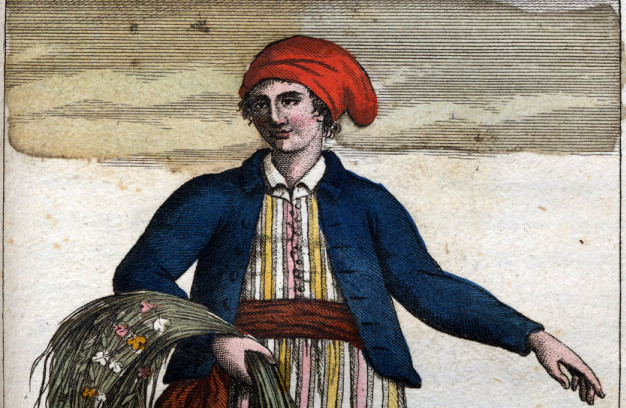
The first woman to circumnavigate the world did so dressed as a man. In 1766, 26-year-old Jeanne Baret joined a French expedition hoping to conceal her identity for three years. In this week’s episode of the Futility Closet podcast we’ll tell the story of her historic journey around the globe.
We’ll also hear Mark Twain’s shark story and puzzle over a foiled con artist.
Intro:
In 1856 Samuel Hoshour wrote an imaginary correspondence full of polysyllabic words.
In 1974 Dennis Upper published a study of his intractable writer’s block.
Sources for our feature on Jeanne Baret:
Glynis Ridley, The Discovery of Jeanne Baret, 2010.
Sandra Knapp, “History: The Plantswoman Who Dressed as a Boy,” Nature 470 (Feb. 3, 2011), 36–37.
Eric J. Tepe, Glynis Ridley, and Lynn Bohs, “A New Species of Solanum Named for Jeanne Baret, an Overlooked Contributor to the History of Botany,” PhytoKeys 8 (2012), 37.
H. Walter Lack, “The Discovery, Naming and Typification of Bougainvillea spectabilis (Nyctaginaceae),” Willdenowia 42:1 (2012), 117-127.
Genevieve K. Walden and Robert Patterson, “Nomenclature of Subdivisions Within Phacelia (Boraginaceae: Hydrophylloideae),” Madroño 59:4 (2012), 211-223.
Beth N. Orcutt and Ivona Cetinic, “Women in Oceanography: Continuing Challenges,” Oceanography 27:4 (2014), 5-13.
Londa Schiebinger, “Exotic Abortifacients and Lost Knowledge,” Lancet 371:9614 (2008), 718-719.
Frank N. Egerton, “History of Ecological Sciences, Part 61C: Marine Biogeography, 1690s–1940s,” Bulletin of the Ecological Society of America 100:1 (January 2019), 1-55.
Vivienne Baillie Gerritsen, “Moody Wallpaper,” Protein Spotlight 33 (2003).
Richard H. Grove, “Origins of Western Environmentalism,” Scientific American 267:1 (July 1992), 42-47.
Allison Bohac and Susan Milius, “Science Notebook,” Science News 181:5 (March 10, 2012), 4.
Londa Schiebinger, “Jeanne Baret: The First Woman to Circumnavigate the Globe,” Endeavour 27:1 (2003), 22-25.
Raquel González Rivas, “Gulf ‘Alter-Latinas’: Cross-Dressing Women Travel Beyond the Gulfs of Transnationality and Transexuality,” Southern Literary Journal 46:2 (Spring 2014), 128-139.
Andy Martin, “The Enlightenment in Paradise: Bougainville, Tahiti, and the Duty of Desire,” Eighteenth-Century Studies 41:2 (Winter 2008), 203-216.
Françoise Lionnet, “Shipwrecks, Slavery, and the Challenge of Global Comparison: From Fiction to Archive in the Colonial Indian Ocean,” Comparative Literature 64:4 (2012), 446-461.
Marie-Hélène Ghabut, “Female as Other: The Subversion of the Canon Through Female Figures in Diderot’s Work,” Diderot Studies 27 (1998), 57-66.
Londa Schiebinger, “Feminist History of Colonial Science,” Hypatia 19:1 (Winter 2004), 233-254.
Kai Mikkonen, “Narrative Interruptions and the Civilized Woman: The Figures of Veiling and Unveiling in Diderot’s Supplément au Voyage de Bougainville,” Diderot Studies 27 (1998), 129-147.
Londa Schiebinger, “Agnotology and Exotic Abortifacients: The Cultural Production of Ignorance in the Eighteenth-Century Atlantic World,” Proceedings of the American Philosophical Society 149:3 (2005), 316-343.
“5 Underrated Pioneers in Circumnavigation,” New York Times, Oct. 14, 2016.
Brian Maffly, “Botanical Explorer Jeanne Baret Finally Gets Her Due,” Salt Lake Tribune, Jan. 18, 2012.
“Incredible Voyage,” Wall Street Journal, Jan. 24, 2011.
“A Female Explorer Discovered on the High Seas,” All Things Considered, National Public Radio, Dec. 26, 2010.
“Briefing: Jeanne Baret,” [Glasgow] Herald, March 8, 2005, 13.
Christine Hamelin, “An Ace Adventurer, a Brilliant Botanist,” Kingston Whig, March 5, 2005, 2.
Elizabeth Kiernan, “The Amazing Feat of Jeanne Baret,” New York Botanical Garden, March 12, 2014.
Listener mail:
“This Is Your Story,” The Ernie Kovacs Show, 1957:
David Margolick, “Sid Caesar’s Finest Sketch,” New Yorker, Feb. 14, 2014.
Wikipedia, “Sid Caesar” (accessed March 15, 2019).
Wikipedia, “Following the Equator” (accessed April 13, 2019).
Wikipedia, “Cecil Rhodes” (accessed April 13, 2019).
“Following the Equator, 1895-1896,” UC Berkeley Library (accessed April 13, 2019).
Mark Twain, Following the Equator, 1897.
This week’s lateral thinking puzzle was contributed by listener David White.
You can listen using the player above, download this episode directly, or subscribe on Google Podcasts, on Apple Podcasts, or via the RSS feed at https://futilitycloset.libsyn.com/rss.
Please consider becoming a patron of Futility Closet — you can choose the amount you want to pledge, and we’ve set up some rewards to help thank you for your support. You can also make a one-time donation on the Support Us page of the Futility Closet website.
Many thanks to Doug Ross for the music in this episode.
If you have any questions or comments you can reach us at podcast@futilitycloset.com. Thanks for listening!
